From ensuring student success to studying the lived experiences of middle-class Puerto Ricans, those of Hispanic heritage are engaged with seemingly every facet of Case Western Reserve University.
In recognition of Hispanic Heritage Month, which takes place each year from Sept. 15 through Oct. 15, The Daily is celebrating the accomplishments and experiences of five of those Hispanic members of the CWRU community. Discover more about their experiences at the university—and learn how their heritage has impacted their lives.
Answers have been lightly edited for clarity and length.
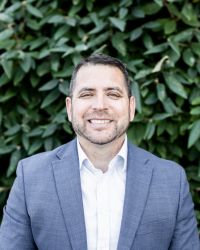
Oscar Ramos
Associate director of the Undergraduate Research Office
Hispanic Heritage Month came into existence following the independence of Latin American countries, so if you ask Oscar Ramos, the month is a celebration of freedom for all Hispanic individuals. To him, “freedom is something everyone in the United States enjoys”—and he doesn’t take that for granted.
“My ancestors came to this country looking for freedom and opportunity,” said Ramos, who has roots in Mexico. “They wanted a better life for the generations that would come after them, of which I am a part. I feel a responsibility to carry forward the ‘heritage’ of the many Hispanic individuals who are looking for inspiration to freely live out their dreams.”
Read on to learn more from Ramos.
Q: Why are you passionate about your role at CWRU? Do you share your culture with any of your colleagues or students in your role?
A: I get to help students discover ways to maximize their potential through participation in research. Conducting research is all about generating new knowledge and I love providing pathways for students to do this while helping them develop an edge for graduate school, professional school and the marketplace.
I have had the opportunity to share my culture with students to empower them to develop a sense of appreciation for their background. Our CWRU students bring such diverse and innovative ideas to their academic work, and it is important for them to first be introspective about their personal experiences as a guidepost to research ideas!
Q: What has your career path looked like so far?
A: For many years, I have worked in student success, with much focus given towards underrepresented minorities. In the recent past, I was an overseer of a few academic achievement and support centers at Kent State University, where I directed the Student Multicultural Center and the Academic Success Center. Previously, I was director of the Abilene Christian University Ronald E. McNair Post-Baccalaureate Achievement Program which prepares first-generation and underrepresented college students for doctoral education.
Q: What do you think the campus community should know about Hispanic Heritage Month or Hispanic heritage in general?
A: They are a part of the evolving story of Hispanic Heritage Month. Therefore, as we honor and celebrate Hispanic Heritage Month, it is good to conceptualize “Hispanic heritage” as something that is not a static moment in time! Rather, “Hispanic heritage” is a dynamic experience where everyone here at Case Western Reserve University has an opportunity to contribute to and learn from Hispanic culture.
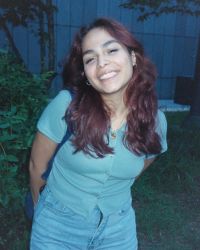
Helen Trujillo
Third-year student studying international studies and economics
Though she grew up in Akron, Ohio, Helen Trujillo has roots in both Colombia and Ecuador, where her father and mother are from, respectively. In Cleveland, she’s had trouble finding Ecuadorian and Colombian restaurants to dine at to connect with that part of her heritage—but luckily, her mother is just a phone call away.
“I’ll call my mom for a recipe which is never exact,” Trujillo said, “it’s always a ‘pinch of this’ and ‘a bit of this, but not too much.’”
Read more from Trujillo.
Q: Why did you choose to study at CWRU?
A: I chose CWRU because of its open-door policy. I applied to CWRU with the intention of studying cognitive science (pre-med), but I was not quite sure and because of this policy, I was able to take many random classes that appealed to me. I realized what was important to me and decided to study international studies and economics.
Q: What led you to study international studies and economics?
A: I felt that the U.S. high school curriculum lacked a lot of world history and even lacked U.S. history. I was so intrigued by world politics and history, especially in Latin America. Latin America interested me because it was always dismissed in the high school curriculum even though there is a large Hispanic/Latino population in the United States. I got interested in how U.S. foreign policy affects other parts of the world and how the United States economy and other countries’ economies are affected.
Q: What do you think the campus community should know about Hispanic Heritage Month or Hispanic heritage in general?
A: Hispanic culture is not a singular culture. It should not be treated as a homogenous entity. There are many differences in Hispanic and Latino cultures, for example, languages (Spanish, Portuguese and other indigenous languages: Mayan, Nahuatl, Quechua just to name a few). “Hispanic” is an umbrella term that includes so many countries with different traditions and histories.
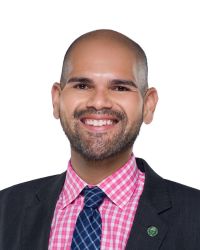
Angel L. Reyes-Rodriguez (GRS ’16, molecular virology)
Angel L. Reyes-Rodriguez was a senior at the University of Puerto Rico, Rio Piedras campus, when he met recruiters from Case Western Reserve who were looking for candidates to be a part of the first cohort of the Postbaccalaureate Research Education Program.
“I wanted to attend graduate school, but I wanted additional research experience before applying to it,” Reyes-Rodriguez said. “I applied for the program and was accepted. As part of the program, I spent a year and a half taking graduate-level courses at CWRU and working full time in a research lab. When it was time to apply to graduate school, CWRU was my first choice.”
Read more from Reyes-Rodriguez.
Q: What has your career path looked like thus far?
A: After completing my PhD, I trained as a postdoctoral fellow at Cleveland Clinic Lerner Research Institute. I invested time in mentoring and developing career opportunities to benefit other students and postdocs during that time. I use the skills I developed in my current role as director of the McNair Scholars Program at Cleveland State University. Our program prepares talented yet underserved undergraduate students for graduate school by providing them services such as a mentorship program, a summer research internship, and career development programming.
Q: How are you celebrating Hispanic Heritage Month?
A: I like celebrating Hispanic Heritage Month by fostering an environment where other Latinx/Hispanics are uplifted and have the opportunities to showcase their identities. I also use the month as a reminder to read books from Hispanic authors or that address Hispanic themes, especially Puerto Rico and its history. I make sure that I am inclusive of the contributions of the many cultures that built the Puerto Rican identity.
Q: What do you think the campus community should know about Hispanic Heritage Month or Hispanic heritage in general?
A: Hispanic/Latinx folks are not a monolith. We come from cultures that differ from one another, have different foods, and descend from different ethnicities. Therefore, to properly celebrate Hispanic heritage we need to start understanding the diversity within the community and uplift those who are marginalized within our cultures.
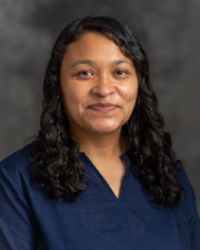
Pita Segura
Postdoc in the Department of Physiology and Biophysics
Even to this day, Pita Segura has vivid memories of creating ofrendas (altars) for Dia de los Muertos with her grandmother when she was a child. Every element was special—from the dishes they prepared, to the vibrant orange Cempasúchil flowers they put on display.
“Assembling the altar was my favorite part; it was incredibly detailed,” said Segura, who grew up in Guanajuato, Mexico. “We hung colorful paper with various shapes, prepared the altar where we placed photographs of our departed family members who would visit us, and arranged their favorite food, drinks, and personal items, bringing back fond memories we shared with nostalgia. We also created a path of Cempasúchil flowers to guide our family to the altar, accompanied by candles.”
Hear more from Segura.
Q: Why are you passionate about your role at CWRU? Do you share your culture with any of your colleagues or students in your role?
A: I have a deep passion for electrophysiology and biophysics because I enjoy understanding how ion channels work. I always try to share my culture with people in my environment, as I believe that solidarity and teamwork are fundamental for success.
Q: What are some important aspects about your culture, and how do you and your family incorporate these things?
A: There are many important aspects of my culture. For example, family unity is crucial to us, and we are supportive of all our family members. Another aspect is the solidarity in our culture; we are known for being supportive and warm people, always ready to help others in difficult situations.In my family, we instill these values in the education of the new generations. During my development, my parents instilled in me several values, such as respect for the elderly, honesty, and solidarity.
Q: What does Hispanic Heritage Month mean to you?
A: Hispanic Heritage Month provides a wonderful opportunity to share our culture with others, allowing them to learn more about our traditions and beliefs. It also highlights the contributions of Hispanic people in various professional fields at CWRU.
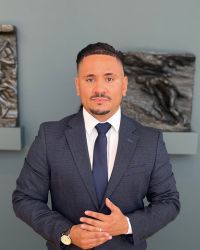
Jacob Rivera
Sociology PhD student
Jacob Rivera is a proud Clevelander, but the genesis of his story begins in Guayama, Puerto Rico, where his family is from. Similar to other Puerto Rican families in the diaspora, his family settled in places like Massachusetts, New York, and later, Cleveland, Ohio.
“I grew up in a community with a strong sense of Puerto Rican pride,” Rivera noted. “If you visit the Clark-Fulton neighborhood, check out some of the local Puerto Rican restaurants!”
Read more from Rivera.
Q: Why did you decide to pursue a PhD in sociology, and why are you passionate about the subject?
A: As a PhD candidate studying sociology, my research highlights the lived experiences of middle-class Puerto Ricans. I am currently preparing to conduct my dissertation research in San Juan, Puerto Rico, which examines the intersections of race, class, and the social dynamics of San Juan neighborhoods more broadly.
My area of research developed mostly out of my frustration with sociological literature. It appeared as if academic conversations of Puerto Ricans covered topics mostly around poverty, and as a consequence, perpetuated negative stereotypes of Puerto Ricans. Of course, topics around inequality are critical to study, so that we might find data driven solutions to solve social problems, however, what is missing from academic discourse on Puerto Rican studies is one that includes the experiences of middle and upper class Puerto Ricans.
Q: What does Hispanic Heritage Month mean to you?
A: It represents our resiliency and intellectual contributions. Hands down. Beyond our music and food, our intellectual ideas, scientific discoveries, academic contributions, and genius truly makes us rockstars.
Q: What have you enjoyed most about studying at CWRU?
A: Connecting with Puerto Rican students who come to study at CWRU is always fun for me. I learn a great deal from them, and we always have this special connection to our community and Puerto Rico. Those moments, while rare, are remarkable for me.
To my fellow Puerto Rican undergraduate and graduate students here at CWRU, I am extremely proud of you. Your ideas and contributions are inspiring! Stay focused and stay the course! And if we have not already met, reach out! We can grab a Cafecito sometime.
Get to know other Hispanic members of the university community.
